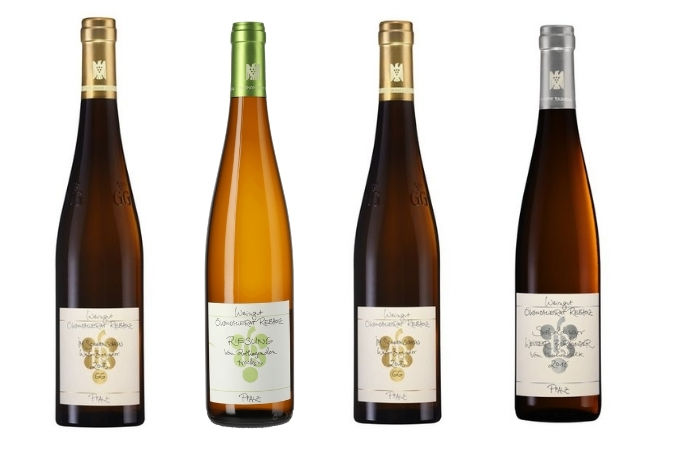Natural wine continues to gain traction among wine lovers. And while it has yet to earn the devotion of every wine drinker on the planet, there’s no doubt that many admire the approach. We all tend to want what we consume to be as genuine and authentic as possible, after all – which explains the rapid rise of everything from organic produce to reality TV.
The viticultural approach of letting nature take its course was adopted by Eduard Rebholz of Weingut Ökonomierat Rebholz way back in the 1940s. He had a simple-but-straightforward belief that the natural character of wine, captured in the freshly harvested grapes, should not be compromised. That was his creed and the basis for his lasting success.
Eduard died in 1966, but his son Hans proceeded on the path his father had set out. Making fully fermented wines without the then-common Süßreserve (an addition of unfermented or partially fermented grape must), Rebholz was a frontrunner in the revival of dry white wines in Germany in the 1970s and 1980s.


That pioneering spirit has been passed down the generations. Expanding the winery to its current 22 hectares, Hansjörg, Eduard’s grandson – who helped to run the winery at the tender age of 19 after Hans’ death in 1978 – has since turned to biodynamic farming, and given up practices such as fining (filtering). It all makes for a characterful, compelling range of wines.
The villages of the Pfalz are on the eastern slopes of the Haardt Mountains, a northerly continuation of the Alsatian Vosges, with most vineyards facing east towards the Rhine Valley. It’s a forgiving climate in many ways – the densely wooded slopes provide protection from westerly winds and rains, and are responsible in large part for the relatively warm and sunny climate.
Rebholz is based in the southern part of Pfalz, the südliche Weinstraße, where mountain peaks offer less protection from the elements. Growers here take advantage of the many fissures and valleys, such as the Queich Valley, where vineyards like Rebholz’s Erste Lage (Premier Cru) Frankweiler Biengarten are fully south-facing for maximum sunshine.
The topographical diversity and the huge variety of soils allows Hansjörg Rebholz to explore a wide range of expressions of Riesling. The winery’s parcels in the higher, cooler reaches of the famous Kastanienbusch vineyard, on poor, iron-rich slate, produce natural wines of intensity and freshness; then the loamy sandstone and gravel soils of the Sonnenschein vineyard produce a pure Riesling style with mouthwatering salinity and stony minerality.
The Frankweiler Biengarten vineyard, planted on shell limestone (Muschelkalk) delivers fine examples of very dry Riesling: notes of stone fruit, ripe apple, lemon and bracing acidity balanced by hints of of salt and smokiness. The structure of these wines makes them famously long-lived.

But while Riesling is Rebholz’s signature grape variety, some of the winery’s best sites (Erste and Große Lagen) are reserved for three members of the Pinot family (Pinot Blanc, Pinot Gris, Pinot Noir) and Chardonnay. The limestone undersoil and the south-eastern exposure of the grand cru Mandelberg provide perfect conditions for refined and fresh Weißburgunders (Pinot Blancs). Then there’s the Albersweiler Latt vineyard, with it’s 70-year-old, pergola-trained Gewürztraminer. It’s an unusual site in the Pfalz, but Hansjörg keeps it as a tribute both to a classic German grape, and to his grandfather, who planted it.
Biodynamism aside, vinification at Rebholz is relatively straightforward for most of the white wines. After harvesting, often in several passes, and a thorough selection process, the grapes are destemmed and soaked on their skins for 24 hours. The clarified must ferments spontaneously or is inoculated with Rebholz’s own strain of yeast, and young wine is left on its full lees in stainless steel tanks for several months.
Rebholz’s resultant range is extensive, covering dozens of different styles – the Chardonnays and Sauvignon Blancs of the “R” range, for example, are aimed more at an international audience (minimal skin contact and aged in barrique). Then there are the regional and village wines (Gutsweine and Ortsweine respectively) from the Pinot family, as well as Sauvignon Blanc, Muskateller and Silvaner. The Gutsweine are all named after the dominant soil type: Buntsandstein (sandstone), Rotliegendes (red slate), Muschelkalk, Lößlehm (loamy loess). They are studies in their mother rock; natural wines of transparency, energy and purity.

Rebholz’s plan is to gradually improve the quality of all the winery’s vineyard stock. “Through a process of selling our lesser vineyards and buying better plots, and by better practice in all the vineyards, almost all our grapes have the potential to end up as a Grosses Gewächs,” he says.
After more than four decades of Hansjörg’s leadership, a new generation is getting ready to take charge at one of Germany’s pre-eminent wineries. “We currently run the winery as a triumvirate,” Hansjörg says. His sons Hans and Valentin, who have worked at such wineries as Foradori in Trentino and Burgundy’s Comtes Lafon, bring a wealth of experience. As the business develops and is handed down over the generations, the urge to improve by experiment and inquiry seems undimmed. As Hansjörg says: “My grandfather’s creed isn’t set in stone. We are honing his ideas continuously.”
The wines of Weingut Ökonomierat Rebholz are distributed in the UK by Justerini & Brooks






